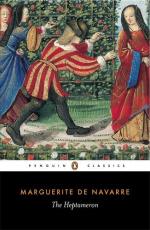There were also among the French two gentlemen who had gone to the baths rather that they might be in the company of the ladies whose lovers they were, than because of any failure in their health. These gentlemen, seeing that the company was departing and that the husbands of their ladies were taking them away, resolved to follow them at a distance without making their design known to any one. But one evening, while the two married gentlemen and their wives were in the house of one who was more of a robber than a peasant, the two lovers, who were lodged in a farmhouse hard by, heard about midnight a great uproar. They got up, together with their serving-men, and inquired what this tumult meant. The poor man, in great fear, told them that it was caused by certain evil-doers who were come to share the spoil which was in the house of their fellow-bandit. Thereupon the gentlemen immediately took their arms, and with their serving-men set forth to succour the ladies, esteeming it a happier thing to die for them than to outlive them.
When they reached the house, they found the first door broken through, and the two gentlemen with their servants defending themselves valiantly. But inasmuch as they were outnumbered by the robbers, and were also sorely wounded, they were beginning to fall back, having already lost many of their servants. The two gentlemen, looking in at the windows, perceived the ladies shrieking and sobbing so bitterly that their hearts swelled with pity and love at the sight; and, like two enraged bears coming down from the mountains, they fell upon the bandits with such fury that many of them were slain, while the remainder, unwilling to await their onset, fled to a hiding-place which was known to them.
When the gentlemen had worsted these rogues and had slain the host himself among the rest, they heard that the man’s wife was even worse than her husband; and they therefore sent her after him with a sword-thrust. Then they entered a lower room, where they found one of the married gentlemen on the point of death. The other had received no hurt, save that his clothes were all pierced with thrusts and that his sword was broken in two. The poor gentleman, perceiving what help the two had afforded him, embraced and thanked them, and besought them not to abandon him, which was to them a very agreeable request. When they had buried the dead gentleman, and had comforted his wife as well as they were able, they took the road which God set before them, not knowing whither they were going.
If it pleases you to know the names of the three gentlemen, the married one was called Hircan, and his wife Parlamente, the name of the widow being Longarine; of the two lovers one was called Dagoucin and the other Saffredent. After having been the whole day on horseback, towards evening they descried a belfry, whither with toil and trouble they made the best of their way, and on their arrival were kindly received by the Abbot and the monks. The abbey is called St. Savyn.(4)




